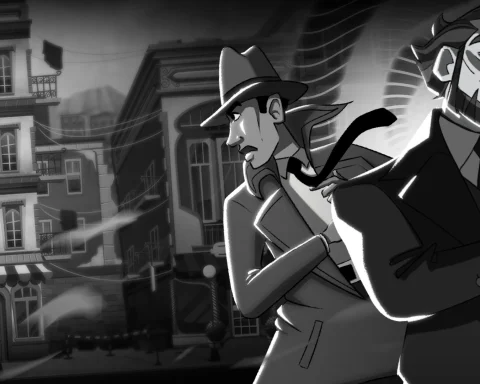The question of “what happens after the world has been saved from the end boss” is one that a few RPGs have explored over the years. It’s a difficult topic to tackle as a video game, though, because it naturally assumes that the world has returned to a state of peace, and RPGs tend to rely on combat as a core part of the loop. What’s more, how do you challenge the combat powers of the person or team that has just, by definition, defeated the most powerful evil on the planet? Slimes don’t cut it any more in this kind of scenario. Littlewood offers the latest crack at this concept, and while it takes “lo-fi” beyond what is reasonable for a commercial project, it is a sweet little thing.
Littlewood bills itself as an “RPG”, but it’s not really. It’s much more focused on community, building relationships and helping your little village recover from the devastation that you, in the narrative before the game, fought to save. Amusingly, though you do play as the hero that saved the world, they’re also experienced amnesia from the experience – a clever narrative nod to that common-to-the-point-of-ridiculous trope that kicks off so many RPGs. As a consequence of this amnesia, the first task is to start reconnecting with your party-mates, building them houses, and dropping in some basic facilities like marketplaces and shops.
What is immediately notable about Littlewood is just how much personality every character has. You’ll quickly come to associate each of the little sprites with some kind of character, whether it’s the former teammate that simply cannot shut up when reminiscing about the past, the vaguely creepy old man, or the duck-like elitist snob. You’re not going to love all of these characters, but that’s kind of the point – in every small community there’s always one or two that you just don’t want to get along with. They’re all well-written, and efficiently so, too; this developer squeezes a lot of charm out of few words, which is an admirable ability.
Gameplay has more than a passing resemblance to the likes of Harvest Moon or Story of Seasons, which is going to make things tough for Littlewood, releasing in the same time frame as both a new Harvest Moon and Story of Seasons title, but as we’ve seen with Stardew Valley in the past, the audience for this “genre” are partial to the indie efforts. You’ll spend your days collecting up resources, completing tasks for the various denizens of the town, selling bits and pieces for some cash, and eventually filling your house with all kinds of creature comforts. There’s no meaningful time pressure in Littlewood (you’ve effectively retired, after all), and so instead the village is just a free-form sandbox to play around with at your own pleasure.
It’s all so pleasant, and that’s both Littlewood’s greatest quality and its biggest issue. In being so overwhelmingly pleasant it’s also a game sorely in need of a point to exist. The main goal here seems to be to undertake activities to level up those activities and in doing so you’ll be able to fulfil requests and over time, encourage more people to live in your village. The problem is that the RPG Maker-like aesthetics don’t really make this a rewarding process. Lacking the charm of a Story of Seasons or Animal Crossing means the grind for materials can – and does – become tiring, especially when spaced out over a game that is just so content-filled.
There are some additional areas to explore, and earn resources from, but it’s worth emphasising here that Littlewood might bill itself as an “RPG,” but there is no combat here. Indeed the hero, despite having defeated the great evil, has no physical abilities at all – that amnesia must have been really hard on them. Instead, you “level up” just about every activity you take on – mining, fishing, your relationship with each individual character, and… well, I’m not really sure why you do this. I do not understand why the developer felt the need to stick experience levels in there, other than as an effort to contextualise the grind that you’ll experience from the rest of the game.
Because boy can it be a grind. At first, Littlewood actually seems quite generous. Whenever you look to build something, the resources that you need are to hand, having already gathered them up. While you might need to save for a couple of in-game days to get the cash together for a particular item, it’s never too onerous. The problem is that the deeper you get into the game, the rarer the materials that you need, and it can be exhausting trying to track some of those down, which stalls progress and turns each in-game day into a loop until you finally nab that rare material.
Littlewood is charming and bright, and wears its “indie spirit” on its sleeve. The developer has created something highly playable that also acts as a lovely homage to the Harvest Moon tradition. By all accounts, Littlewood has been a commercial success, too, on its prior release on PC. That success is deservedly so, but hopefully the developer can invest some of that into some refinements for whatever their next project is, but there’s more ambition in Littlewood than the scope of the budget allowed.









